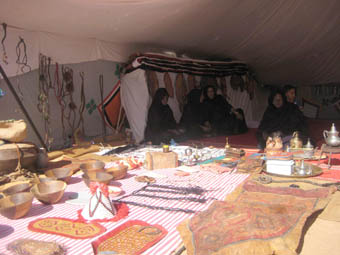
The first phase of the project 'Consolidation of the Cultural Centre and Training Activities Program', which was held in Tindouf (western Algeria), finished with about 120 Sahrawi officers and leaders, mostly women, direct beneficiaries of this initiative, which was implemented within the framework of the call for cooperation for development projects, sponsored by the Office of the Vice-Principal for International Relations and Cooperation of the University of Valencia, run by Olga Gil, and whose management involves the General Foundation of the academic institution.
It is estimated that indirectly, more than 30,000 residents in the refugee camps will perceive in their everyday life the results of these courses, framed in Training Activities Program and taught online. Regarding this aspect, as Kheira Boulahi, Minister of Training, Personnel and Civil Service, said during the closing ceremony of the courses, "the University of Valencia is the first academic institution to support the Saharawi people in online training."
The project was coordinated by Javier Boix, Professor of Pathology, Faculty of Medicine and Dentistry, and Angel Orti, Professor of Economic Analysis and retired, both from the University of Valencia, and has also relied on the collaboration of volunteer teachers.
As explained by Boix, the work to consolidate the Cultural Centre have started, conditioning it definitely with a classroom, from a previous project, which has been isolated so that no desert sand enters and which now has air conditioning, and other amenities. The indirect impact of these improvements affects a number of beneficiaries estimated at about 5,000 users per year.
The centre, which is linked to the Ministry of Culture of the Sahrawi Arab Democratic Republic (SADR), has also been fitted with a megabyte ADSL line for one year, which has allowed to perform five online courses for women and young people. "Broadband means for the Ministry to be in communication with the outside world quickly and effectively. Now, from the middle of the desert, out of nowhere, they have access to both information and training, to MOOCs, open online courses, for example" said Boix.
These achievements meet the objectives set out in the agreement signed between the University of Valencia and the Government of the SADR in the month of March, which has launched a pioneering experiment that is being followed closely, as reported by Javier Boix, by other public universities. "They're trying to make a platform in Madrid and our project has been an advance," he says.
The woman, a key figure in the Tindouf camp
"Sahara is an area with basic needs such as education and health. There are serious endemic health problems aggravated by their refugee status outside of their homeland. The camps were also created by women because the men were away at war periods: thirty percent of parliament are women and we must help them," says the pathologist.
In this sense, Ortí says: "Indeed, the Saharawi woman feels a protagonist and has achieved high levels of accountability in government and social life in the camps."
That's why we put forward five courses designed especially for women and young Sahrawis. All ten hour long courses. The first, 'Saharawi Women and Leadership', has been followed by 22 students and its main objective was to strengthen the capacities of women who want to participate in activities of interest to the community. It has enjoyed the cooperation of the National Union of Saharawi Women (NUSW). Its impact is estimated at about 3,000 Sahrawi women who benefited indirectly.
'Family and School' has been a largely female course which provided teachers with the skills to manage effectively and positively possible conflicts in education. This initiative has been supported by the Saharawi Ministry of Education, which has encouraged the participation of primary school teachers who pursue their educational activity in schools in the camps. 28 students have attended and over 4,000 school pupils have benefited indirectly.
Other courses have been 'Reproductive Health in Saharawi women', followed by 22 women aged between fifteen and sixty, and 'first aid camps', with 17 students, who have had the collaboration of the Ministry of Health. In the first, which has an estimated impact is about 8,000 women indirectly benefited, has aimed to train and update knowledge from women involved in health care activities related to the content of the course, and the second, which has affected indirectly some 7,000 residents in the camps, was about the basic first aid techniques that can influence the lives of the various camps.
Finally, we have developed a course for recovery and management of historical and cultural heritage, with 22 students and 4,000 indirect impact beneficiaries, mostly women. "In the context of primary needs, it seems that culture is not important, but we must maintain consistency of the people, unity, and that's why, through this course, we wanted to help train people to systematize Saharawi historical and cultural reality: poetry, music and culture. We are strengthening their roots, their identity," said the professor.
"We want this project to continue on through a second phase that will last until next autumn. We want to emphasize the Spanish language, the second language of the Sahrawi people, with the completion of courses for teachers in the camps" agreed both coordinators, Javier Boix and Angel Orti.
Last update: 2 de may de 2013 11:27.
News release



















